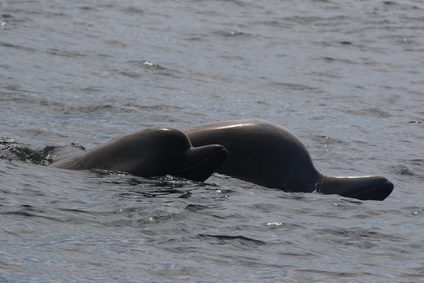
For Immediate Release: November 21, 2016
Halifax, NS -
Scientists studying Northern bottlenose whales are alarmed about seismic surveys (used to find oil and gas deposits below the sea floor) and where they are being conducted in the marine regions off Newfoundland. The lack of consistent application of mitigation measures is raising further alarms that populations are being harmed even before they can be adequately studied and identified.
“In our 2015/16 field studies we observed and sampled what appears to be a new population of Northern bottlenose whales in the Flemish Cap area off Newfoundland, straddling international waters. We also observed, heard and have been alerted to substantial seismic operations in this area,“ said Dr. Hal Whitehead a Northern Bottlenose whale expert with Dalhousie University.
“Northern bottlenose whales are deep divers, and members of the beaked whale family, which is thought to be one of the groups of cetaceans most sensitive to seismic noise. This endangered species needs protection, not further assault,” according to Gretchen Fitzgerald, National Program Director, Sierra Club Canada Foundation. “The best mitigation is complete avoidance of the area. Why isn`t the offshore petroleum board not applying the precautionary approach and doing all it can to reduce the impacts of this intense noise pollution on whales” she asked.
The last review of Northern bottlenose populations in Canada suggested that there were two populations (1) the Endangered Scotian Shelf population and (2) the Special Concern Labrador-Davis Strait population. The Northern Bottlenose found in the Gully off Sable Island, consists of less than 150 animals. These population units are currently divided by an arbitrary administrative boundary across the middle of the Grand Banks in Newfoundland waters. For seismic operations in Newfoundland, Northern bottlenose are not a species which requires shutting down the seismic shooting when they are within 500 m, and it appears that all of the Newfoundland bottlenose whales are managed as part of the northern, less threatened population. This is despite the southern areas of the Grand Banks being considered as part of the Endangered Scotian Shelf population's range.
“The voluntary measures laid out in the Canadian Statement of Practice with respect to the mitigation of seismic sound in the marine environment are not being adhered to,” according to Dr. Whitehead. “Of particular concern is the C-NLOPB’s practice of allowing seismic in low visibility. As the Newfoundland offshore petroleum board does not require Passive Acoustic Monitoring for cetaceans on their vessels, this means there is zero chance of spotting whales when vessels operate at night and in fog. Repeated surveying of the same areas over multiple years is also occurring.”
“Our concern is that the industry in Newfoundland waters are not operating on a precautionary basis and the cetaceans in these areas are more likely to be adversely impacted, especially considering the amount of seismic activity in the Newfoundland region,” said Laura Feyrer, a PhD student at Dalhousie University who is performing the genetic analysis to confirm the existence of a new population off southern Newfoundland as part of her doctoral research. “As researchers, this makes our exciting discovery of a possible new population of whales bittersweet, as even before they can be identified, this population is under siege.”
-30-
Attachments:
New Bottlenose Whale Research Sites
Map - Digital vs Non-Digital 2-D Seismic Coverage - NFLD coverage
Verified New Bottlenose Whale Detections
Image - Bottlenose Whale and Calf
For further information, please contact
Dr. Hal Whitehead
University Research Professor
Department of Biology, Dalhousie University
Phone: 1-902-494-3723
Mobile: 1-902-414-6140
Email: hwhitehe@dal.ca
Laura Feyrer
PhD Candidate
Department of Biology, Dalhousie University
Phone: 1-902-494-3723
Email: LJFeyrer@dal.ca
Gretchen Fitzgerald
National Program Director
Sierra Club Canada Foundation
Mobile:- 1-902-444-7096
Email: gretchenf@sierraclub.ca
